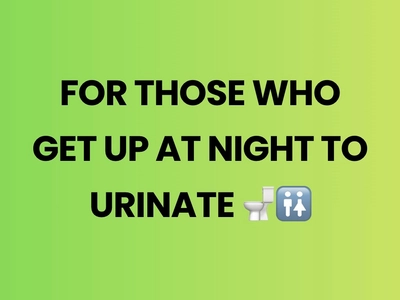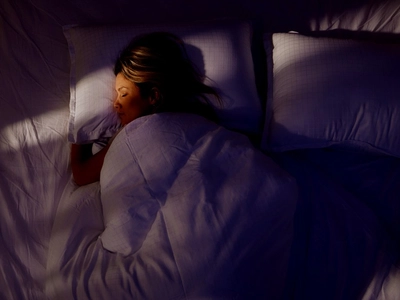What’s the Line Between Normal and Abnormal Nighttime Urination?
Most people enjoy a good night’s rest without interruptions. But for many, waking up to use the bathroom in the middle of the night is a regular part of life. Sometimes it happens only once in a while, like after drinking a large glass of water before bed. Other times, it can become a nightly routine that keeps you from sleeping deeply.
This habit of waking up during the night to urinate is called nocturia. It can range from harmless to bothersome to a sign of an underlying health issue. Knowing when nighttime bathroom trips are normal and when they might signal a problem is important for your health, your energy levels, and your overall quality of life.
In this guide, we’ll look at what’s considered normal, when it becomes abnormal, possible causes, and practical ways to manage it. We’ll also explore when to see a doctor and why paying attention to nocturia can improve your long-term health.
What’s Considered Normal?
Most healthy adults are able to sleep six to eight hours without needing to urinate. That’s because your body naturally balances fluids and hormones during sleep to allow for uninterrupted rest.
Still, it’s not unusual for some people to wake up once a night to go to the bathroom. This can happen if you:
- Drink large amounts of fluids before bed.
- Consume caffeine or alcohol in the evening.
- Have a lighter sleep cycle that makes you more aware of your bladder.
For younger and middle-aged adults, waking up once a night to urinate is usually not a problem. As people grow older, however, it becomes more common.
Aging and Nighttime Urination
As we age, the body goes through changes that can make nocturia more likely:
- Hormonal changes – The body produces less of a hormone called vasopressin. This hormone helps the kidneys hold onto fluid at night. With less vasopressin, the kidneys release more urine while you sleep.
- Smaller bladder capacity – The bladder’s ability to store urine decreases with age, meaning it fills up faster.
- Medical conditions – Older adults are more likely to have health conditions such as diabetes, prostate enlargement, or heart problems that contribute to nocturia.
This is why adults over 60 often experience nighttime urination more than younger people.
When Does Nighttime Urination Become Abnormal?
Occasional nighttime urination isn’t a cause for concern. But if you’re waking up two or more times every night on a regular basis, it might be a sign of abnormal nocturia.
You should pay closer attention if:
- You wake up multiple times at night even though you haven’t had much to drink before bed.
- You feel a sudden, urgent, or painful need to urinate.
- Your sleep quality is poor, leaving you tired and irritable during the day.
- You produce a large volume of urine at night (a condition called nocturnal polyuria).
- You need to urinate more often during the day as well as at night.
Sleep disruptions caused by frequent bathroom trips can reduce deep sleep, which is essential for physical repair, memory, and mental health. Over time, this lack of restful sleep can lead to fatigue, mood changes, and even weakened immunity.
Common Causes of Abnormal Nocturia
Nocturia isn’t a single disease—it’s a symptom. Many health and lifestyle factors can contribute to it. Below are the most common causes:
1. Overactive Bladder (OAB)
In this condition, the bladder muscles contract too often, creating a frequent urge to urinate—even if the bladder isn’t full. OAB can cause both daytime and nighttime bathroom trips.
2. Urinary Tract Infections (UTIs)
UTIs irritate the bladder and urethra, causing burning sensations and increased urgency. They can happen at any age but are more common in women.
3. Diabetes
When blood sugar levels are high, the kidneys work harder to filter and remove the excess glucose. This results in increased urine production, including at night. Both type 1 and type 2 diabetes can cause nocturia if blood sugar is not well managed.
4. Prostate Problems (in Men)
An enlarged prostate (benign prostatic hyperplasia, or BPH) can block urine flow, causing the bladder to work harder and leading to frequent urination. Prostate inflammation or cancer may also cause similar symptoms.
5. Congestive Heart Failure
Heart failure can lead to fluid buildup in the legs during the day. At night, when you lie down, this fluid re-enters the bloodstream, gets processed by the kidneys, and produces more urine.
6. Sleep Disorders
Conditions like sleep apnea or insomnia can make you wake up more often at night. Sometimes people mistake nighttime awakenings due to sleep problems for the need to urinate.
7. Medications
Some medications, especially diuretics (water pills), increase urine output. If taken too late in the day, they may cause nocturia. Other drugs for high blood pressure, heart disease, or mood disorders may also contribute.
8. Lifestyle Factors
- Drinking a lot of fluids in the evening.
- Alcohol and caffeine intake, which irritate the bladder.
- High salt intake, which can affect fluid balance.
9. Other Medical Conditions
- Kidney disease – Reduced kidney function can alter urine production.
- Liver disease – Fluid retention can shift during the night.
- Pregnancy – The growing uterus puts pressure on the bladder.
Effects of Frequent Nighttime Urination
While nocturia itself may not always be dangerous, the effects of poor sleep can harm health over time. Some of the impacts include:
- Daytime fatigue – Lack of deep sleep reduces energy and productivity.
- Mood changes – Irritability, stress, and even depression can worsen with chronic sleep disturbance.
- Weakened immune system – The body needs sleep to fight infections.
- Memory and focus problems – Deep sleep is crucial for brain function.
- Increased risk of falls – Older adults waking at night may be more likely to fall and injure themselves.
Tips to Manage Nighttime Urination
If nocturia is mild, lifestyle changes can make a big difference. Here are practical tips:
- Limit evening fluids – Try to reduce drinking two to four hours before bedtime.
- Avoid alcohol and caffeine in the evening – Both can irritate the bladder and increase urine production.
- Elevate your legs during the day – If you have swelling, this can help fluids drain earlier, not at night.
- Wear compression socks – They can reduce fluid buildup in the legs.
- Empty your bladder before bed – Double voiding (urinating twice within 10–15 minutes) may help.
- Adjust medication timing – Ask your doctor if diuretics or other drugs can be taken earlier in the day.
- Practice good sleep hygiene – Keep a regular sleep schedule, limit screen time before bed, and create a calm bedroom environment.
- Maintain a healthy weight – Excess weight can worsen sleep apnea and bladder pressure.
- Exercise regularly – Improves overall health, circulation, and bladder function.
- Reduce salt intake – Helps prevent fluid retention.
When to See a Doctor
Not all nighttime urination requires medical treatment. But you should consult a doctor if you notice:
- Waking up two or more times every night for several weeks.
- Sudden changes in your urination habits.
- Pain, burning, or blood in your urine.
- Daytime tiredness that affects your life.
- Swelling in your feet, ankles, or legs.
- Uncontrolled thirst and frequent urination (possible sign of diabetes).
What the Doctor May Do
Your doctor may:
- Ask you to keep a bladder diary – noting fluid intake, urine output, and nighttime awakenings.
- Test for diabetes, kidney issues, or infections.
- Examine prostate health (for men).
- Recommend imaging or blood tests if needed.
- Adjust medications or suggest bladder training exercises.
Treatment depends on the cause. For example:
- UTIs are treated with antibiotics.
- Overactive bladder may be managed with medication or pelvic floor therapy.
- Heart or kidney issues may require specialized treatment.
Long-Term Outlook
The good news is that nocturia is manageable in most cases. Simple lifestyle adjustments often reduce nighttime bathroom trips. When linked to medical conditions, treating the underlying issue usually improves symptoms.
Ignoring frequent nighttime urination, however, may allow serious conditions—like diabetes, heart problems, or kidney disease—to go undetected. That’s why paying attention to your body’s signals is important.
Final Thoughts
Waking up once a night to urinate is generally harmless and often related to fluid intake or normal aging. But if it becomes a regular disruption or affects your sleep and energy, it’s worth taking seriously.
By understanding what’s normal for your age, making healthy lifestyle adjustments, and seeking medical advice when needed, you can protect both your sleep and your overall health. A well-rested body is not just more energetic—it’s also healthier, stronger, and better prepared for the challenges of everyday life.






